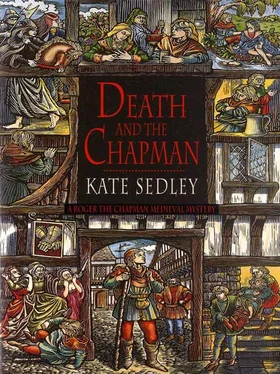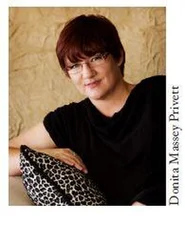Kate Sedley - Death and the Chapman
Здесь есть возможность читать онлайн «Kate Sedley - Death and the Chapman» весь текст электронной книги совершенно бесплатно (целиком полную версию без сокращений). В некоторых случаях можно слушать аудио, скачать через торрент в формате fb2 и присутствует краткое содержание. Жанр: Исторический детектив, на английском языке. Описание произведения, (предисловие) а так же отзывы посетителей доступны на портале библиотеки ЛибКат.
- Название:Death and the Chapman
- Автор:
- Жанр:
- Год:неизвестен
- ISBN:нет данных
- Рейтинг книги:4 / 5. Голосов: 1
-
Избранное:Добавить в избранное
- Отзывы:
-
Ваша оценка:
- 80
- 1
- 2
- 3
- 4
- 5
Death and the Chapman: краткое содержание, описание и аннотация
Предлагаем к чтению аннотацию, описание, краткое содержание или предисловие (зависит от того, что написал сам автор книги «Death and the Chapman»). Если вы не нашли необходимую информацию о книге — напишите в комментариях, мы постараемся отыскать её.
Death and the Chapman — читать онлайн бесплатно полную книгу (весь текст) целиком
Ниже представлен текст книги, разбитый по страницам. Система сохранения места последней прочитанной страницы, позволяет с удобством читать онлайн бесплатно книгу «Death and the Chapman», без необходимости каждый раз заново искать на чём Вы остановились. Поставьте закладку, и сможете в любой момент перейти на страницу, на которой закончили чтение.
Интервал:
Закладка:
I suddenly realized that if anyone were to find me there, stealing around the house like a thief in the night, it would look bad for me. And rightly so. I had kindly been offered shelter, and was abusing the Alderman’s hospitality by spying on him and his family. And for no good reason; nothing that I could even explain to myself.
Yet I made no attempt to go, lowering my weight to sit on a stair and continuing to peer over the top one. After a moment or two, there came the whisper of voices and then another noise which sounded like kissing. Seconds later, Marjorie Dyer, in a billowing white nightshift, appeared in the doorway like a voluminous ghost and softly closed the bedchamber door behind her. She tiptoed past me, only inches from my face, and vanished up the second flight of stairs to her own room in the attics.
The blood rushed into my face, and I cursed myself roundly for a Peeping Tom. What more natural than that the widowed Alderman should find comfort of a sort with his housekeeper, who was also his cousin? I felt deeply ashamed of myself and began easing my way downstairs. How could I have been so foolish as to imagine that anything sinister was happening? I blamed the nightmare, although it was difficult to understand why I had been so frightened. It now seemed nothing more than an unpleasant dream.
Affairs in the kitchen were exactly as I had left them; Ned still sound asleep in his corner, sucking his thumb; Rob drunkenly snoring. Neither had awakened to miss me, and I resumed my place near the almost dead fire, resting my head on my pack and wrapping myself in my cloak for warmth. I had no trouble this time in dropping off, with no fears of my dream recurring, and was once more on the borderline of sleep when I found myself wide awake again. The thing which had been puzzling me, nagging away at the back of my mind all evening, had suddenly pushed its way to the fore. If Clement Weaver had been murdered by footpads for his money and possessions, as seemed most likely, why had his attackers bothered to remove the body? Having ransacked his pockets and seized his saddle-bags, why had they not simply left him lying there, on the roadway? Why impede their escape by carrying a corpse along with them?
The more I thought about it, the less sense it made. Swiftness of hand and fleetness of foot were surely the essence of highway robbery. An ordinary pickpocket or footpad, having once accomplished the deed, would have melted away into the darkness; back into that criminal world whence he had come, with its maze of alleyways and taverns and brothels…
My head spun with weariness. It seemed a long time since I had left Whitchurch early the previous morning. My head ached and I felt I was becoming obsessed by something which was not my problem. I had taken to the open road for the freedom it offered; to live for myself and not to become involved with things that did not concern me. But if I was to achieve this desirable state, I should have to learn to be less curious. ‘Nosey’ was the harsher word my mother had always used for it.
‘You must learn, my son, to keep that nose of yours out of other people’s business.’
I resolved sleepily to be off at the crack of dawn, before anyone else was stirring. I would shake Bristol’s dust off my feet and, with luck, be at the village of Keynsham by dinner-time.
Part Two: September 1471, Canterbury
Chapter 6
The Saint’s tomb gleamed with hundreds of precious stones, so thickly encrusted that the gold in which they were set was well-nigh invisible. Above the tomb hung St Thomas’s hair shirt, and, to the left, was a small spring which had been seen to run with milk and blood. In the crypt behind it was one of the swords which had killed the Archbishop; while in the choir, adorned with yet more jewels and large creamy pearls, stood a picture of the Virgin, which, so it was said, had talked with the Saint during his lifetime. The enormous ruby, the Regale of France, given by King Louis, seventh of his name, glowed like liquid fire, and the candlelight struck sparks from the sapphires and diamonds.
There were other relics, too, here in this great cathedral where Thomas a Becket had been martyred three centuries ago; the nails and right arm of St George, some of the Holy Thorns which had pierced Christ’s brow, a tooth of John the Baptist, a finger of St Urban, and the upper lip of one of the Murdered Innocents. Even I, coming so recently from Glastonbury, the oldest Christian shrine in England, was overwhelmed by the sanctity of the place, and by the awestruck devotion of the many pilgrims around me.
I, too, had travelled the last part of my journey by the Pilgrims’ Way, joining it after I left Southampton, where I had gone to replenish my stock of merchandise from some of the ships just put into port, and from the market in High Street near St Lawrence’s church. By purchasing in bulk from the stall-holders I could get things cheap, then add the necessary penny to make my profit when selling to outlying villagers and hamlet-dwellers. It was a rougher life than I had anticipated when I first set out on my travels. I had slept under as many hedges and in draughty barns as I had in the slightly less spartan conditions of an abbey or a priory guest-house. Yet I wouldn’t have changed it for all the safety of four permanent walls, even though I knew I had so far had the best of the weather and that the winter was still to come.
‘You’ll change your tune, my lad,’ a fellow traveller had said to me one evening, ‘when the roads are blocked with snow or slippery with ice, and the womenfolk won’t venture out of doors.’ He was an unfrocked priest, turned out of his parish for some misdemeanour and forced to beg for his living from door to door. It was a bad night, I remember, cold and wet, and we had taken refuge in somebody’s byre just to get out of the rain. If the owner discovered us, no doubt we should have been turned out into the elements, but the cows had been milked and had raised no alarm, merely chewing the cud contentedly and regarding us with solemn, incurious eyes.
But even under those conditions, and with my companion’s pessimism sounding in my ears, I had no regrets. ‘I’ll deal with winter when it comes,’ I said, taking bread and cheese from the pouch at my waist and sharing it with my doleful ex-priest. We cheered one another up through a night of fitful slumber by exchanging scurrilous anecdotes about the Church and churchmen.
But now, standing on the hallowed ground of Canterbury, I felt ashamed of my ribaldry, and something like nostalgia for my former life momentarily swept over me. I wanted to be one again with the brothers at Glastonbury and to feel assured of Christ’s love. I looked into the face of the painted Virgin, searching for some sign of divine approval for the decision I had taken to leave the Abbey.
‘Holy Mother, pray for me, now and in the hour of my death.’ I crossed myself, at the same moment becoming aware of the kneeling figure on my right, draped from head to toe in black and with a heavy veil concealing her face. To one side of, and slightly behind, this supplicant, whoever she was, a young girl wriggled uncomfortably, her knees pressed against the cold stone. She, too, was dressed in mourning, but it was plain and unadorned with any gold cross or jet rosary, such as hung about the woman’s neck. Obviously, they were mistress and maid.
From somewhere, a draught stirred the woman’s veil, and I was immediately transported back to Bristol, that warm May day almost five months ago when I had seen Anne Neville, together with Margaret of Anjou, riding along Corn Street. Then, they had been mother and daughter-in-law: now, the fortunes of both had been irrevocably changed. For the clash of arms which everyone expected had in fact taken place only two days later at Tewkesbury, and King Edward had been victorious. Margaret’s son and Anne Neville’s young husband, Edward of Lancaster, had been killed during the battle, whatever our present so-called historians might tell you to the contrary. He was not murdered afterwards by Richard of Gloucester, nor was his father; although Henry Plantagenet was undoubtedly put to death in the Tower, on the orders of the King, however much Edward and his Council would have wished us to believe that the poor man died of ‘pure displeasure and melancholy’. Margaret of Anjou was at this time a prisoner of the King, while her erstwhile daughter-in-law had been restored to her sister, Isabel, and was living in the Duke of Clarence’s household as an honoured guest.
Читать дальшеИнтервал:
Закладка:
Похожие книги на «Death and the Chapman»
Представляем Вашему вниманию похожие книги на «Death and the Chapman» списком для выбора. Мы отобрали схожую по названию и смыслу литературу в надежде предоставить читателям больше вариантов отыскать новые, интересные, ещё непрочитанные произведения.
Обсуждение, отзывы о книге «Death and the Chapman» и просто собственные мнения читателей. Оставьте ваши комментарии, напишите, что Вы думаете о произведении, его смысле или главных героях. Укажите что конкретно понравилось, а что нет, и почему Вы так считаете.












